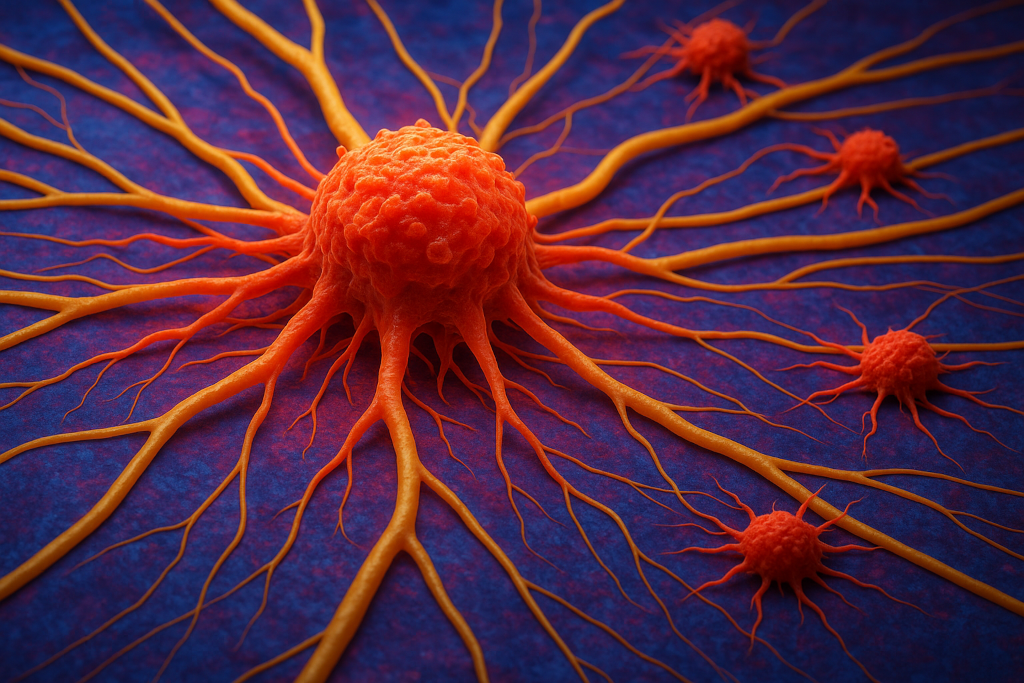It starts with a single cell. Silent. Invisible. And then one day, someone you love gets the news: “The cancer has spread.” Just five words—but they change everything.
This is the moment many patients and families fear most. Not just because it sounds serious, but because deep down, we know: when cancer metastasizes, it becomes a whole new kind of enemy.
But what does “spreading” mean, really? And how do these rogue cancer cells travel throughout the body, setting up dangerous new territory?
Let’s pull back the curtain on metastasis. What it is, how it works, and why it’s one of cancer’s deadliest tricks.
Not just any spread — the cancer spreads itself
Metastasis isn’t random. It’s a highly organized—but deadly—process in which cancer cells escape their original tumor and establish new ones elsewhere in the body.
Imagine an invasive species of weed. It doesn’t stay in one corner of your yard—it sends seeds into the wind. That’s what cancer does, too.
Here’s how the process unfolds:
- Cancer cells break away from the original (primary) tumor.
- They enter the body’s bloodstreams or lymphatic system—its transportation highways.
- They ride these highways to distant organs like the lungs, liver, brain, or bones.
- Once they arrive, they begin building new tumors (called metastases), made of the same type of cancer cells as the original tumor.
So yes, a person with breast cancer that has spread to the lung doesn’t suddenly have lung cancer—they have breast cancer cells growing in their lung.
Why metastasis changes the game
Here’s a hard truth: around 90% of cancer-related deaths are linked to metastasis, not the original tumor itself.
Why? Because treating widespread cells is much harder than removing a single lump. Metastatic cancer often:
- Spreads silently, before symptoms appear
- Reaches organs that are critical for survival (like the brain or liver)
- It is more resistant to standard treatments like chemotherapy or surgery
Scientific proof: A 2011 study published in Nature
Researchers traced the journey of breast cancer cells in mice and found that metastasis involved not just physical movement, but genetic adaptations—a sort of survival training that made the cells tougher, sneakier, deadlier.
This discovery helped explain why some cancers can lie dormant in the body for months or years, then suddenly become a threat again.
But wait… not all cancer spreads the same way
Different types of cancer spread in different patterns. For example:
- Prostate cancer often targets bones first.
- Colon cancer tends to spread to the liver.
- Lung cancer often moves to the brain and adrenal glands.
Understanding these “preferred paths” helps doctors scan intelligently, catch it early, and treat accordingly.
What does this mean for you?
If you’ve ever wondered why early detection matters, this is it.
Once cancer reaches other organs, it’s like a wildfire that’s jumped the firebreak—it requires more aggressive, often less effective treatment. But when caught early, many cancers—including breast, prostate, and colon—can be treated before they metastasize.
Your takeaway:
- Stay up to date on cancer screenings.
- Pay attention to unexplained symptoms that don’t go away.
- Support research that focuses on stopping metastasis before it starts.
The path forward
The more we understand metastasis, the better we can stop it. Researchers are already exploring ways to block cancer’s ability to “hitch a ride” through the bloodstream, or to shut down its cellular signals that tell it to invade.
But until then, the fight against metastatic cancer is best won by catching it before it runs. Early action saves lives—plain and simple.
So if you’re on the fence about making that doctor’s appointment, consider this your sign: it’s more than peace of mind. It could be the difference between a single battle and an all-out war.




Leave a Comment